Key takeaways:
- Reparations activism bridges the historical injustices faced by marginalized communities, highlighting the need for acknowledgment and redress.
- Key figures like Ta-Nehisi Coates and Rep. Sheila Jackson Lee significantly influence the reparations movement by advocating for awareness and legislative action.
- Personal experiences and community engagements inspire a deeper understanding of systemic racism and the moral imperative for reparations.
- Future goals include fostering collaboration among diverse voices and expanding educational initiatives to empower future generations in advocating for reparations.

Understanding reparations politics
Reparations politics is a multifaceted discussion that touches on issues of justice, equity, and historical accountability. I often find myself reflecting on the profound impact that systemic racism has had on marginalized communities. When I think about reparations, I can’t help but ponder how we can truly address the historical wrongs that still resonate today.
I’ve had conversations with friends who share their own family histories, revealing deep generational pain caused by systemic oppression. These stories resonate deeply with me and highlight why reparations are not just a political issue but a personal one. How can we expect to heal as a society if we ignore the wounds of the past?
Engaging with reparations politics means recognizing the long-standing disparities ingrained in our social fabric. For example, as I learn about the historical context behind these discussions, I am reminded of the struggles for social justice that have paved the way for today’s movements. Does addressing these injustices not deserve a thoughtful and comprehensive approach? I believe that understanding the foundations of this topic is crucial to crafting meaningful solutions moving forward.
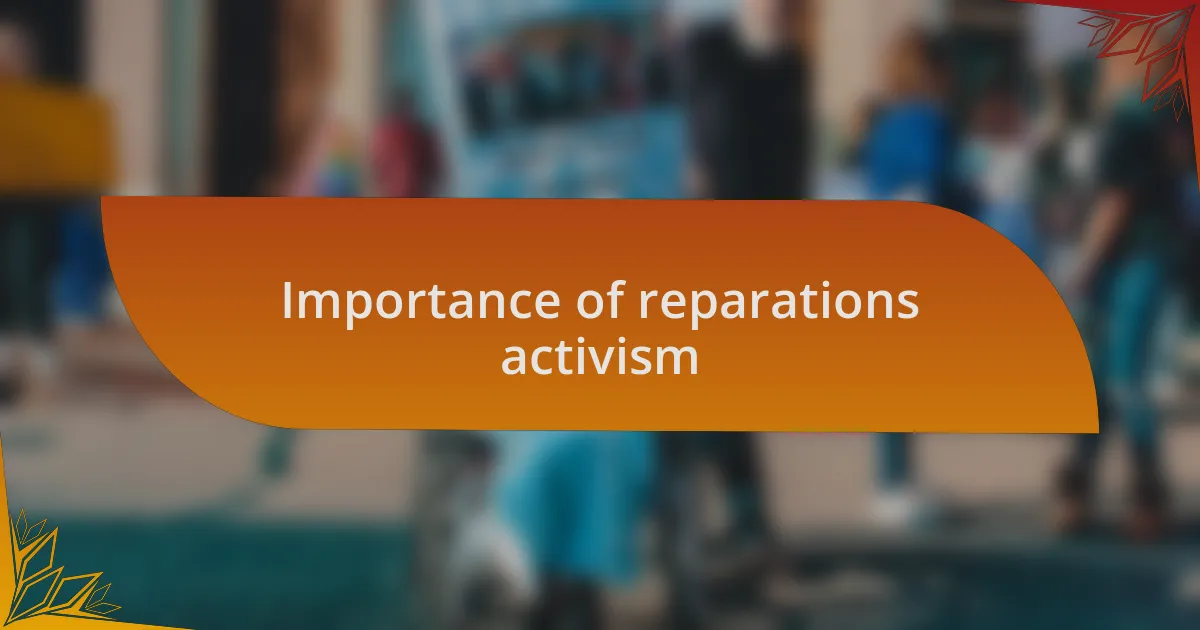
Importance of reparations activism
Reparations activism plays a vital role in bridging the gaps left by centuries of injustice. I remember attending a community forum where a survivor of systemic inequity shared her family’s experience. It struck me how her narrative wasn’t just hers—it’s a shared history for many. By actively engaging in reparations activism, we are amplifying these crucial stories and ensuring that they become part of the larger narrative, one that demands acknowledgment and redress.
Moreover, I see reparations activism as essential for societal healing. When I connect with people who have been affected by systemic racism, it’s evident that the scars run deep. How can we foster unity and understanding if we ignore the pain that persists? The more we advocate for reparations, the more we create opportunities for dialogue that can lead to healing and reconciliation on a community level.
Lastly, the importance of reparations activism extends beyond just addressing financial compensation; it embodies a moral obligation to ensure justice. I often reflect on my conversations with activists who emphasize how reparations should also involve education and restorative practices. Isn’t it our responsibility to learn from history and shape a future that recognizes the value of all lives? Through activism, we confront uncomfortable truths, paving the way for a more just society that honors our collective past.
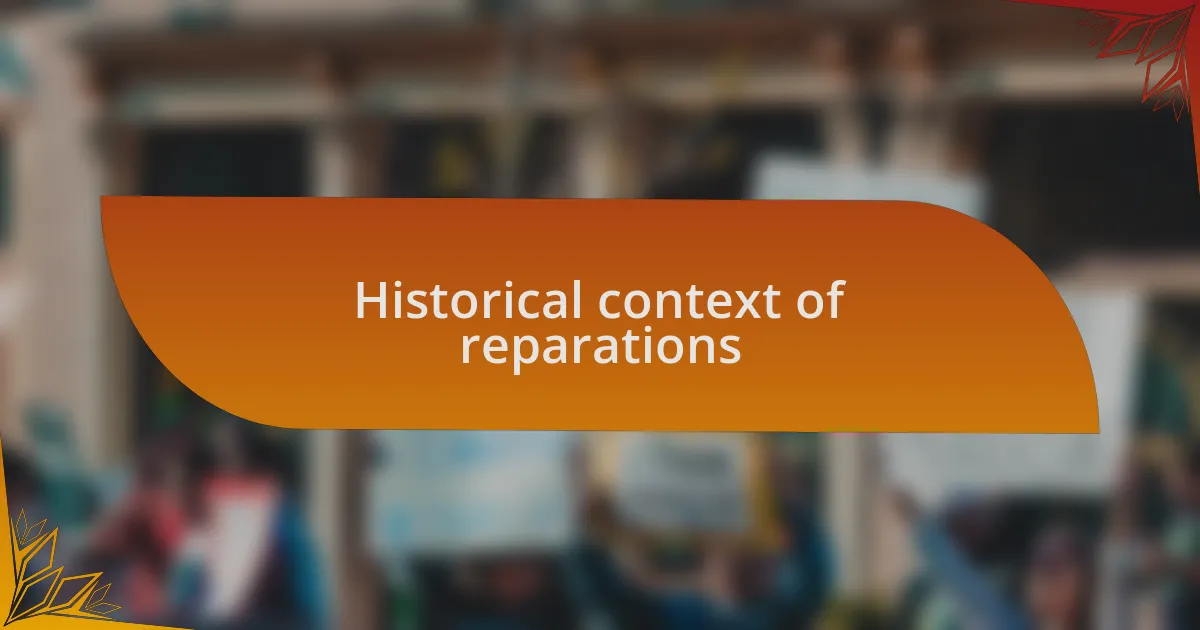
Historical context of reparations
The historical context of reparations is deeply rooted in centuries of systemic oppression and exploitation. I remember studying the aftermath of the Civil War, where promises made, like the 40 acres and a mule, were never fulfilled. What becomes clear is that these broken promises set the stage for ongoing economic disparities that resonate today.
Throughout history, various governments have acknowledged the need for reparations. For instance, the U.S. government’s reparations to Japanese Americans after World War II are often cited as a precedent. I can’t help but wonder why similar recognition hasn’t been afforded to descendants of enslaved Africans. Is it not time to address these inequities with the same seriousness?
Moreover, the global context of reparations is an equally compelling narrative. Countries like Germany have taken steps to make amends for the Holocaust, offering reparations to survivors and their families. Reflecting on this, I often find myself asking why the United States has been so hesitant in its approach. Isn’t it essential for societal growth to acknowledge and rectify past injustices? Each of these historical examples reinforces the urgency of reparations activism in our own context, moving from acknowledgment to action.
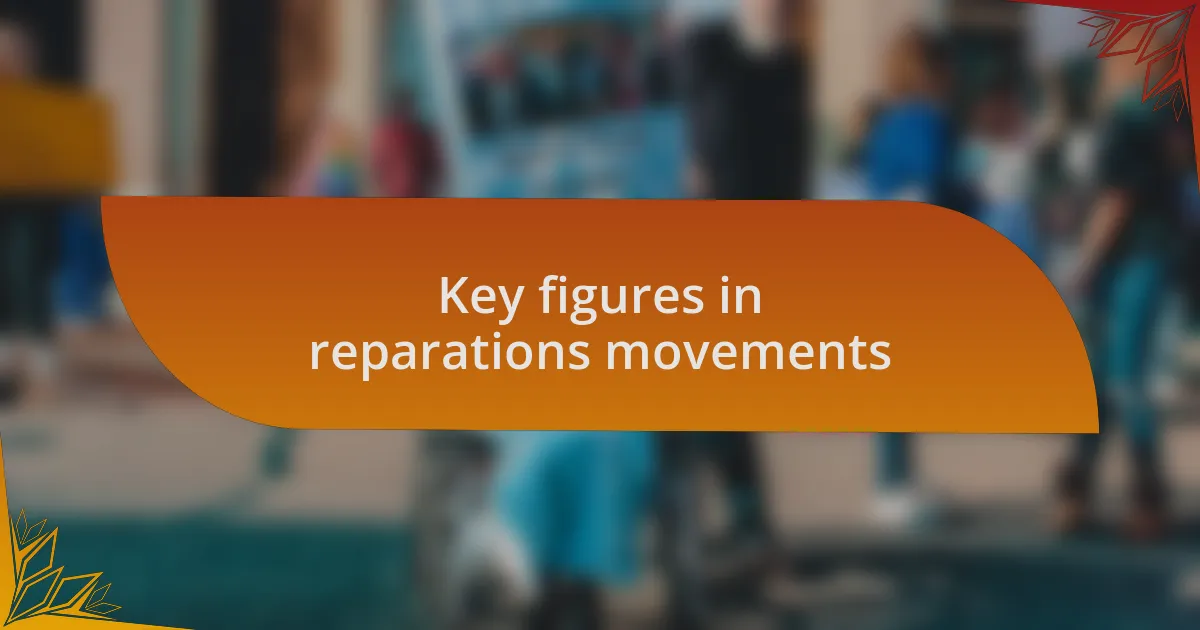
Key figures in reparations movements
One key figure in the reparations movement is Ta-Nehisi Coates, whose 2014 essay “The Case for Reparations” reignited national discourse on the subject. I remember reading his work and feeling a surge of understanding—he eloquently outlined the historical injustices faced by Black Americans, linking them to present-day inequalities. His passionate argument made me question why this is still such a contentious topic, when the evidence for reparations seems so undeniable.
Another influential person is Rep. Sheila Jackson Lee, who has tirelessly championed legislation to establish a commission to study reparations. Witnessing her dedication during hearings highlighted for me the importance of political advocacy in this fight. It made me realize how essential it is to have representatives who not only understand the weight of history but are willing to take tangible steps toward justice.
Lastly, we cannot overlook the countless grassroots activists who have worked on the ground to push for reparations. I’ve met individuals at local rallies who share powerful stories about their ancestors, and their determination inspires a collective hope. This grassroots element of the reparations movement makes me reflect on how each person’s narrative contributes to a broader call for justice—it’s a tapestry woven from personal experiences, demanding acknowledgment and action.
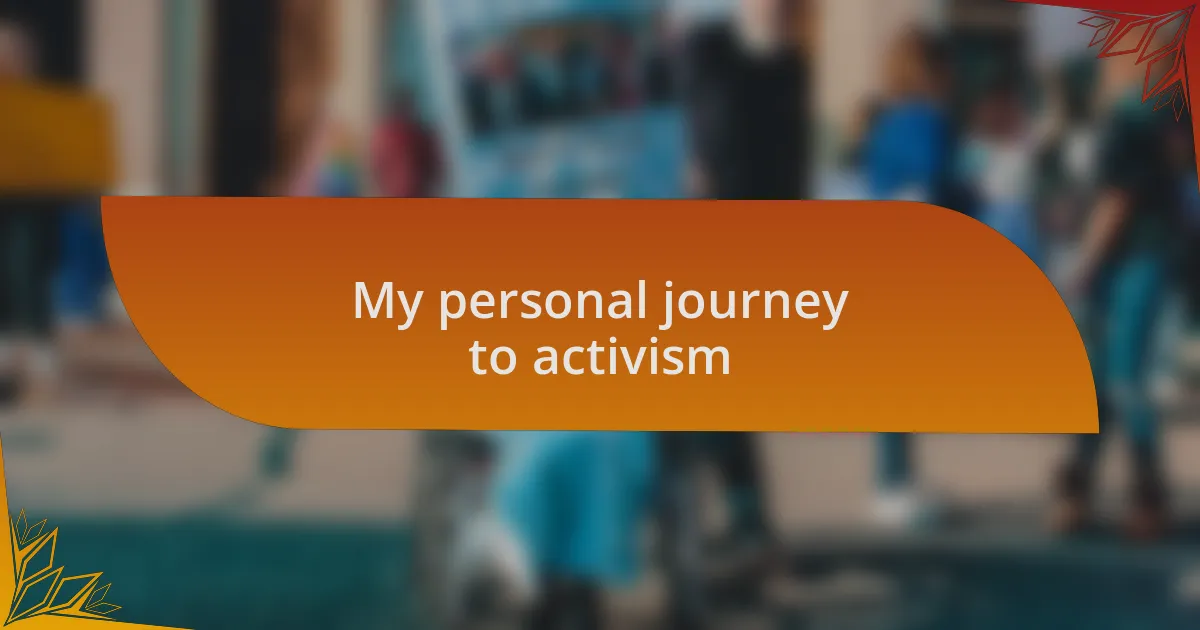
My personal journey to activism
Activism wasn’t always on my radar; it unfolded through a series of profound realizations. I remember the first time I attended a community meeting about reparations. I was struck by the raw emotions shared by participants as they recounted their family histories and the lasting impacts of systemic racism. Their stories lingered in my mind and ignited a sense of responsibility in me—I couldn’t just sit back any longer.
As I delved deeper into the topic, a pivotal moment came when I confronted my own privilege and the implications of my family’s history. I started asking myself questions like: What have I done to contribute to a more equitable society? This introspection was uncomfortable but necessary. It pushed me to engage with not only the facts about reparations but also the moral imperative behind them. Each piece of information became a stepping stone towards my activism.
My journey has led me to connect with diverse individuals deeply committed to this cause. During an event, I met an elder who had been fighting for reparations for decades. Listening to his unwavering commitment filled me with a sense of urgency and purpose. It made me ponder how history repeats itself if we don’t learn from it. These encounters have shaped my understanding and solidified my resolve to be part of a movement that seeks justice for those wronged.

Experiences that shaped my views
One experience that profoundly reshaped my views on reparations was a conversation I had with a close friend who shared her family’s history of displacement due to discriminatory housing policies. As she recounted the struggles her grandparents faced and the generational trauma that followed, I felt a wave of empathy wash over me. How could I have been unaware of these injustices? This moment made me realize that reparations aren’t just about financial compensation; they are about healing and acknowledging the past.
Another significant moment for me was attending a workshop that focused on the economic disparities resulting from systemic inequality. The statistics presented were staggering, but what really struck me were the personal testimonies from participants who had experienced the consequences firsthand. I found myself grappling with a question: What does it mean to really listen to these stories and act on them?
During a recent rally, I was moved by the passionate speeches from youth activists. Their energy and commitment reminded me of my own early days of learning about these issues. As I stood there, surrounded by signs and voices calling for justice, I asked myself, “How can I contribute to this larger narrative?” Those moments of connection have forged my resolve, pushing me to not only advocate for reparations but also to listen and learn from those who have been impacted most deeply.
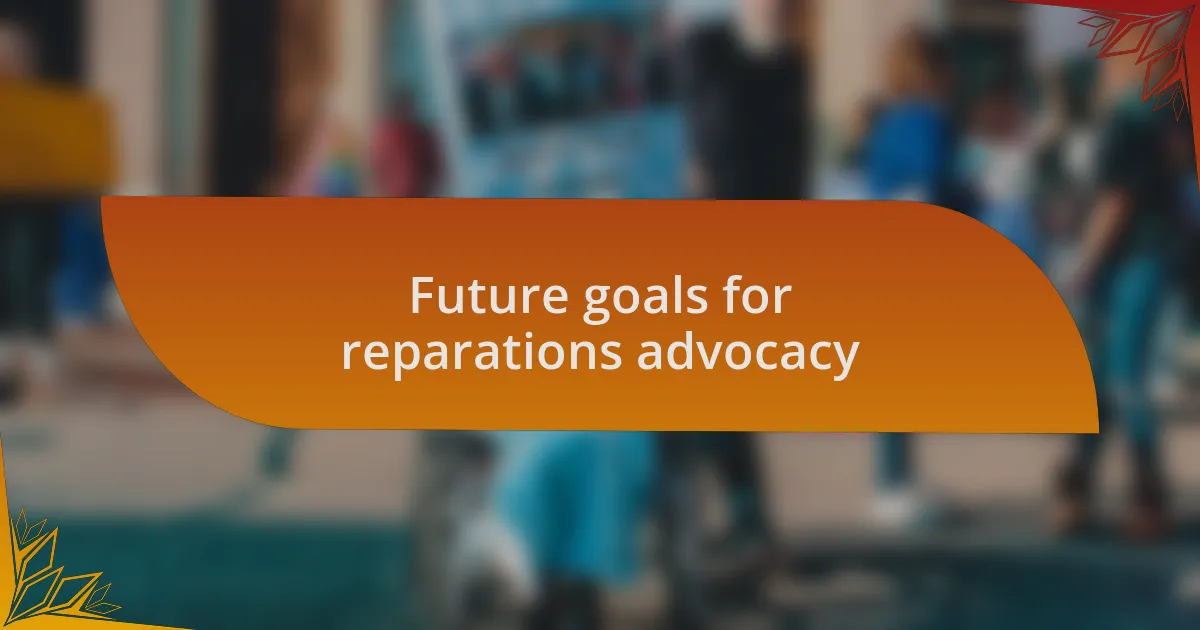
Future goals for reparations advocacy
Envisioning the future of reparations advocacy, I see a landscape defined by unity and collaboration among diverse voices. My encounters with grassroots organizations have illuminated the necessity for a sustained coalition that brings together community leaders, policymakers, and impacted individuals. How can we ensure that everyone has a seat at the table? By prioritizing this inclusivity, we create a multi-dimensional approach that amplifies the urgency and relevance of reparations discourse.
Another goal I aspire to is the expansion of educational initiatives that inform the public about the historical injustices surrounding reparations. I recall a workshop where attendees, some initially skeptical, left inspired to engage with the complexities of these issues. It struck me how information could bridge divides, fostering understanding and empathy. Wouldn’t it be transformative if knowledge about reparations became a staple in our educational systems, empowering future generations to advocate for justice?
Lastly, I’m committed to amplifying the narratives of those who have been directly affected by systemic injustice. I often think about the stories I’ve heard, each one a testament to resilience and strength. If we can elevate these voices, we not only honor their experiences but also challenge the prevailing narratives that seek to silence them. It’s a powerful reminder that reparations advocacy is not just about policy—it’s deeply personal, rooted in the lived experiences of individuals fighting for recognition and restoration.